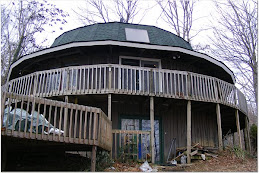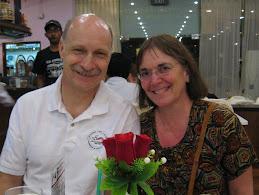It has been somewhat odd and disconnected for me to be focused these past 2 weeks on "reconstruction" surgery versus "cancer-removing" surgery. I see now that having the reconstruction done immediately effectively lessened the impact of the "OMG, I've got Cancer!" response, and gave me something to hone in on besides the gut-clenching, disease-fearing part.
In a way, I feel as though I might have bypassed something important here, a lesson to be learned or a character-building moment I will never retrieve? I've been temporarily distracted from the Breast Cancer-Fighting Mindset to focus on the Breast Rebuilding-Healing Mindset. Many women, in fact, choose to postpone the rebuilding phase until after the full treatment regimen, so as to put all their energy into ridding themselves of the disease before moving on. Did I unwittingly shortstop that process? Will I be able to garner my mental and physical resources again for the continuing issue of fighting the cancer that may or may not still be lurking after the surgical treatment? I'm not sure about my answers to those questions yet.
Part of it was an observation by my friend Jayne about the generational differences in the perception of what a diagnosis of cancer means. She said that when she told her mother and her sisters about her breast cancer, they all cried. When she told her nieces and nephews, they said casually "Oh, good! At least you have something that is treatable." The difference is that in one generation, cancer has gone from being an automatic death sentence to a treatable condition, and our gut reactions are based on how old we are. I am old enough to remember a childhood friend dying from leukemia--yet, I am also the aunt of an ALL survivor, my niece Bonnie. With Jayne's recognition of this generation gap, I started thinking as my own children do about my disease. As daughter Juli said, "At least it's something they can remove, like breasts--it's not something you really need like a liver or a brain!" Sure they were scared of the potentially fatal possibilities, but they mostly were relieved when the initial shock and fear passed. I came to this place as well, through their reactions.
I do know that the visceral impact of the anticipated mastectomy (complete with actual photos, thanks to the internet) may have made me more amenable to the immediate reconstruction option when it was offered to me. When I first viewed photos of what the mastectomy would look like and what reconstruction would look like, I was equally traumatized by what I perceived my old familiar body would become. How could it be that these women were smiling in their photos? An automatic camera-say-cheese response? How could they look happy about what their bodies looked like in an objective sense?
And strangely, I have come around to that mental shift as well. I am completely delighted so far by the aesthetic outcome (while I still recognize that objectively, looking like a nipple-less Barbie doll with Corpse Bride patchwork stitches isn't really the photogenic ideal)! I look down my shirt or in the mirror, and I do smile. I have been hardly consumed at all by the cancer-disease-did-they-get-it-all? details, and more focused on can-we-proceed-with-reconstruction? details, leapfrogging ahead to the end before it's really over. There is a great temptation to breathe a premature sigh of relief and pronounce myself "cured," before having done the next hard thing (and the next, and the next).
And the more I read about the next phases, I realize that I'm going to have to gear up again, gather up some more grit, because this stuff never really ends, it never goes away. Fortunately, I don't have to make any huge decisions yet, because we are (unbelievably) still waiting for the darned pathology report from a California lab now. My removed parts were "sent out" for further study, because the initial dissections showed three different kinds of breast cancer, two in each breast. How's that for complicated?
For now, we can assume that for all intents and purposes, my breast cancer has been removed by the surgery. But here's the kicker that wakes me up occasionally--I also have to suppose that whatever conditions existed in my body that led to what I would have to call the "explosive" generation of multiple types of cancer all at once--those conditions still presumably exist inside me. So I'm thinking that there is probably something else going on in my formerly trusted human ecosystem that needs to be dealt with on a microscopic basis with chemo and hormonal and gene therapy, and I hope that one or all will work to correct those conditions.
It could indeed be that all the cancer is gone now, that there isn't a cancerous or pre-cancerous cell left in my body. But I don't think it's likely. Can I go on blithely without further treatment, even if the protocols said that my particular cancer profile statistically usually survives at least 5 years without anything more being done after surgery? I'm not sure I could sleep peacefully at night ever again--I'd always be waiting for either the breast cancer to recur or some other cancer to pop up. Other than the offending tissues being gone, all the same conditions are still in place that gave rise to the cancers in my breasts. Who's to say that it won't happen again, and in something I do need, like a liver or a brain?
So I guess that it's good that I've had something else to focus on besides all the scary stuff still to come. It's good that I too am smiling at my less-than-perfect and perfectly-wonderful new bionic boobs (though don't hold your breath looking for my pix on the internet)!
I do have some time to shop for an oncologist and do some research on what is known (more than in the past) and what is unknown (less than in the future). I realize again that this is going to be a salient feature of my life from now on, despite my desire to just fix it and move on. I'm beginning now to see why people who have been through this call themselves survivors and not victors, because you're never really sure if you're victorious--maybe when you die of something else? None of us gets to live forever, so maybe that's the goal?
But still, the verbiage irks me. I want a less passive word than "survivor." Dr. Jo suggested "warrior," and for now that's what I feel like, and feel like using.
Subscribe to:
Post Comments (Atom)





No comments:
Post a Comment